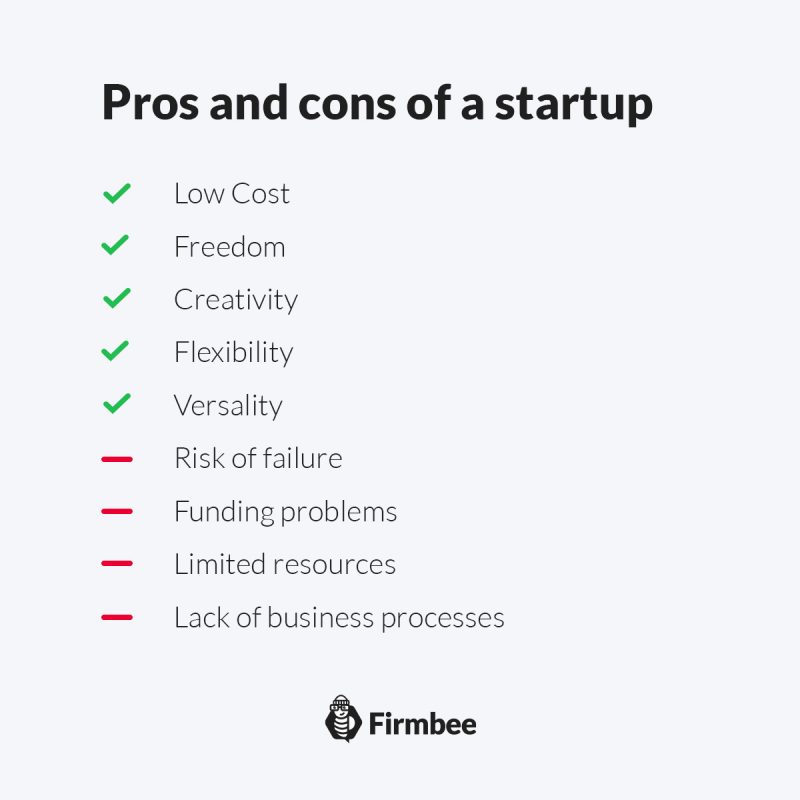Statistics show that most people set up businesses as they want to be their own bosses and pursue their deep passions. While running a company can be an extremely rewarding experience, there are a few potential drawbacks that may make it less suitable for some would-be entrepreneurs. Today, we are shining light on the pros and cons of creating a startup. Read on.
Creating a startup – table of contents:
Advantages of creating a startup
There are a lot of benefits that come with establishing a new business. No wonder that in the United States alone more than 6.5 million startups are created.
Low cost
You don’t have to be a millionaire to launch a startup. In fact, you often don’t need to invest any money in the early stages of its development. Statistics show that 1 out of 3 people who start a new business have a budget of less than $5,000. 77% of new companies are financed with the founder’s personal funds.
Freedom
Founding a startup gives an incredible sense of freedom. Forget rigid schedules and being tied to the typical 9-5 working week. You become your own boss and get an opportunity to fulfill your dreams. In the initial phase, no one imposes anything on you, which obviously can change when an investor appears.
Creativity
As a startup owner, you can take a creative approach to your business. You have a chance to follow your own vision and provide innovative products or services. Startups can’t prosper without creativity. No wonder that startup founders are often called visionaries. Running a startup, you have to look creatively at its every aspect.
Flexibility
Startups offer great flexibility. They usually hire top candidates that can adapt to a new reality very quickly. Change is the essence of every startup. When running such an organization, you need to be able to modify your working methods quickly.
Versatility
Versatility is a great value in business. It is especially evident in startups where teams are usually very small, and the employees perform various tasks. Such a solution allows them to carry out duties that would normally require more staff.

Disadvantages of creating a startup
Unfortunately, you need to be aware of the fact that founding a start-up also has its disadvantages. We have selected the biggest drawbacks of launching a startup. They are as follows:
Risk of failure
The biggest problem and disadvantage of starting a new business is the huge risk involved. Unfortunately, 90% of startups fail, and 10% of them fail within the first year of existence. It doesn’t matter what industry you operate in since the failure rate is similar in all sectors.
Funding problems
In the case of startups, the financial risk is also very high. One out of four companies are unable to obtain the required funding, and only 1% of them turn into unicorn startups. They continue to operate as long as the founder has enough funds, or until the loan money runs out. As the competition is fierce, it is not always so easy to find external funding options.
Limited resources
New ventures usually operate on small budgets, which has its consequences. You can’t allow yourself to swing the imagination and spend a lot on marketing campaigns. When confronted with competitors that have much bigger assets at their disposal, your company may be quickly pushed out of the market.
Lack of business processes
A common problem of startups is a lack of defined business processes. The absence of operational procedures may translate into poor customer service and financial losses, as well as expose your company to legal liability. The right solution here might be outsourcing some tasks to external providers, but this would involve extra costs.
Creating a startup – summary
Is launching a startup a good idea? When you set up a new business, you’re taking a chance. You don’t know if you’re going to succeed or fail. If you are not willing to take that risk, don’t do it. However, if you feel that you have the ambition to start something on your own one day, believe in yourself and start looking for your business concept.
Here we have discussed the pros and cons of creating a startup. You may look at the following article to learn more: Crowdfunding for startups.
If you like our content, join our busy bees community on Facebook, Twitter, LinkedIn, Instagram, YouTube.
Author: Andy Nichols
A problem solver with 5 different degrees and endless reserves of motivation. This makes him a perfect Business Owner & Manager. When searching for employees and partners, openness and curiosity of the world are qualities he values the most.
Launch your startup:
- What is a startup?
- Pros and cons of creating a startup
- 8 best industries for startups
- Top 5 skills every highly successful startup founder needs
- How to create a startup? 7 simple and easy steps
- 6 essential startup development stages
- How to create a startup growth strategy?
- General startup statistics you need to know
- Startup vs. corporate job. Which is right for you?
- 5 incredible companies that started in a garage
- How to find a business idea?
- How to check if your startup idea already exists?
- How to name a startup? Useful tips and strategies
- How to gain business knowledge quickly? 5 best practices
- Why do startups fail? 6 startup ideas you should avoid
- 5 weird business ideas that made millions
- Top 6 most profitable small businesses
- 7 questions to determine if your business idea is worth pursuing
- What is a buyer persona? 5 benefits of creating a buyer persona
- How to validate your business idea? 3 easy steps
- Should you follow your passion? The importance of passion in business
- What is market reseach and why is it important?
- Using social media in business
- What to do when you have too many business ideas?
- How to write a good problem statement for your startup?
- How to test your business idea for real?
- How to create a prototype for a product?
- How to build an MVP?
- How to use surveys for testing your business idea?
- 10 useful tools to validate your business idea
- What is a business plan? 4 types of business plans
- What should be included in a business plan?
- What should a product description include?
- Competitor analysis
- Marketing strategy
- Traditional business plan vs. lean startup plan
- Implementation plan. What is it and how to create it?
- Everything you need to know about patents
- Financial management for startups
- What permits and licenses does my startup need?
- What is the average startup founder salary?
- 4 startup taxes you need to pay
- Which legal structure is best for your business?
- Startup costs. How much money will you need?
- Protection of intellectual property in a startup
- Family funding vs. self-funding
- What is a shareholders’ agreement?
- What should a financial section of a business plan include?


















